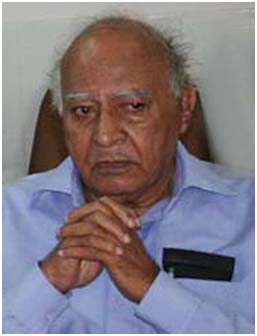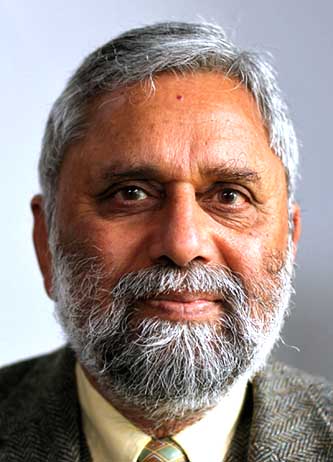Remembering Professor Sheila Bhalla, a Canadian who made Punjab and India her home
Professor Sheila Bhalla (1933-2021), Professor Emeritus at Jawaharlal Nehru University (JNU), an internationally renowned agricultural economist with special expertise in Haryana agriculture, and a scholar with deep engagement with progressive and democratic movements in India passed away on 5th September 2021. She and her husband, Professor G. S. Bhalla, were my teachers at the Department of Economics, Panjab University, Chandigarh (PU), and they were the kind of teachers with whom you keep lifelong contact. Professor Bhalla passed away in 2013. Professor Emeritus at Oxford Brookes Business School –Dr Pritam Singh affectionately and reverently recalls the contribution and impact of his teacher on his life and academic pursuit.
![Professor Sheila Bhalla (1933-2021), Professor Emeritus at Jawaharlal Nehru University (JNU), an internationally renowned agricultural economist with special expertise in Haryana agriculture, and a scholar with deep engagement with progressive and democratic movements in India passed away on 5th September 2021. She and her husband, Professor G. S. Bhalla, were my teachers at the Department of Economics, Panjab University, Chandigarh (PU), and they were the kind of teachers with whom you keep lifelong contact. Professor Bhalla passed away in 2013. […]](https://www.theworldsikhnews.com/wp-content/uploads/2021/09/Sheila-BHalla-360x266.jpg)
SHEILA, AS SHE WAS AFFECTIONATELY KNOWN, was Canadian by background. She met Gurdarshan (G. S. Bhalla) when both were carrying out postgraduate studies at the London School of Economics. Both were attracted to the socialist vision of reorganising economies and societies; in Sheila’s case, she was influenced by her father J. C. W. Scott, a Canadian physicist and radar specialist who was also a committed communist. This shared intellectual and political vision led to Gurdarshan and Sheila getting married and deciding to move to India.
Professor Bhalla came from a large family originating from the village of Badhni Kalan near Moga. To engage meaningfully with her new Punjabi family, Sheila acquired an excellent understanding of the Punjabi language and reasonable proficiency in spoken Punjabi. For a considerable period during their academic careers in Chandigarh and Delhi, Sheila looked after Professor Bhalla’s elderly mother who could only speak and understand Punjabi and developed a loving relationship with her.
 The Bhallas spent their entire lives combining their superb academic work with multiple forms of support for workers’ and peasants’ movements and for democratic rights in India. I have so many memories of them but will share just one today. When they joined PU in 1969, I had just entered the second year of my undergraduate studies. On 2nd September 1969, the Vietnamese leader Ho Chi Minh passed away and some of us organised a meeting in the university to pay homage to his revolutionary leadership. Many students turned up but only two faculty members from the whole university joined the meeting, and they were the Bhallas. It was a great boost to our morale and the beginning of a lifelong relationship.
The Bhallas spent their entire lives combining their superb academic work with multiple forms of support for workers’ and peasants’ movements and for democratic rights in India. I have so many memories of them but will share just one today. When they joined PU in 1969, I had just entered the second year of my undergraduate studies. On 2nd September 1969, the Vietnamese leader Ho Chi Minh passed away and some of us organised a meeting in the university to pay homage to his revolutionary leadership. Many students turned up but only two faculty members from the whole university joined the meeting, and they were the Bhallas. It was a great boost to our morale and the beginning of a lifelong relationship.
The management of PU was, for a very long time, controlled by pro-Arya Samaj right-wing groups supported by the Congress Party and the Jan Sangh, and later by the Bharatiya Janata Party. Together with her husband, Sheila Bhalla played an understated but critical strategic role in challenging the dominance of these parties.
The management of PU was, for a very long time, controlled by pro-Arya Samaj right-wing groups supported by the Congress Party and the Jan Sangh, and later by the Bharatiya Janata Party. Together with her husband, Sheila Bhalla played an understated but critical strategic role in challenging the dominance of these parties. They were assisted in this by their friends Professor Dharam Vir of the Chemical Engineering department (a man of remarkable intellect and moral stature who was a life-long friend of the Bhallas and died almost within a month of Professor Bhalla’s death) and Gurbaksh Singh Soch of the English department (who died young, about 30 years ago). They developed the Panjab University Teachers Association (PUTA) from an organisation of virtually no importance to one that had critical significance to the governance of PU.
When Professor Bhalla successfully challenged a heavy-weight pro-Congress faculty member (Professor V. N. Tiwari) for the office of president of PUTA, Sheila played a key role in organising and strategising their group’s election campaign. Many left-wing teachers such as D. N. Jauhar, Manjit Singh and Ronki Ram (not to mention myself) later became presidents of PUTA, but the influence of left-wing ideology on the organisation was first created by the Bhallas and Professor Vir. Whenever the history of PUTA is written, their names will feature as guiding stars.
I was moved by the care and interest in my welfare and academic progress expressed by the Bhallas.
I was moved by the care and interest in my welfare and academic progress expressed by the Bhallas, as well as by Professor S. B. Rangnekar, the head of the department when they arranged for me to meet Professor Krishna Bharadwaj during her 1971 visit to deliver a series of lectures at PU. That meeting eventually led to my move to JNU in 1972 to study for my M.Phil. under Professor Bharadwaj’s supervision. A few years after my move to JNU, the Bhallas also moved there to join the faculty. While at JNU, Sheila gave me a letter of recommendation to help me apply for further research and academic positions. Her words were such recognition of my worth as a person and as her student that I have kept the letter as a prized possession. I kept in touch with them even after moving to Oxford.
During their time at PU, the most important opportunity and breakthrough in the Bhallas’ research came with the award of a substantial research project grant by the Haryana government to study the development of the Green Revolution in the state. Their first major publication, Changing Agrarian Structure in India: A Study of the Impact of Green Revolution in Haryana (1974), resulted from this project. One important finding of the study was the inverse relationship between farm size and productivity, i.e., when the farm size increases, farm output per acre decreases. The study’s finding that small farmers are more productive resonates today with the farmers’ movement in India, which aims to defend small and marginal farmers against the onslaught of big agro-business firms.
An important finding of their first major publication, Changing Agrarian Structure in India: A Study of the Impact of Green Revolution in Haryana (1974) was the inverse relationship between farm size and productivity.
Subsequently and especially after their move to JNU, a division of intellectual labour seemed to develop between them; Sheila specialised in Haryana and other regions of India such as Andhra Pradesh, and G. S. Bhalla specialised in Punjab and Gujarat among other regions. Sheila pioneered the study of agrarian relations in Haryana and published outstanding papers on the subject.
The tribute paid to Professor Sheila Bhalla by the All India Kisan Sabha (AIKS) recognises the convergence between her intellectual and political work:
“AIKS expresses deep grief at the passing away of Professor Sheila Bhalla, a life-long fighter for the cause of peasants and workers. Her vast array of work helps us to understand the impact of capitalist development on Indian agriculture, the plight of the poor, agricultural labourers, tenant farmers and other peasant groups. An agricultural economist of great renown, after her retirement she continued to live an active life dedicated to studying the changing face of agriculture and the impact of neoliberal economic policies.
Her vast array of work helps us to understand the impact of capitalist development on Indian agriculture, the plight of the poor, agricultural labourers, tenant farmers and other peasant groups.
She was well acquainted with the AIKS, attending not only Seminars or Conferences but also protests, even at her advanced age. She last attended the 33rd All India Conference of the AIKS at Cuddalore in 2013. She was a regular visitor to the AIKS Centre, engaging in long consultations and discussions on her studies of rural India and their findings. She also went through AIKS documents meticulously, suggesting corrections and changes. She took a steadfast position on the assault on education and the recent attacks of the BJP-RSS on JNU, its students and teachers. She has been a much-loved teacher and inspired generations of students”.
Professor Sheila Bhalla is survived by her daughter Gursharan Rastogi, as well as by her sons Upinder Singh Bhalla and Ravinder Singh Bhalla (all three having achieved doctorates in their respective fields in India), and Yoginder Singh Bhalla (living in Canada), together with eight grandchildren some of whom have gone for higher studies to the country of their grandmother’s birth.
 Dr Pritam Singh has a DPhil from the University of Oxford and is Professor Emeritus at Oxford Brookes Business School. He is the author of ‘Federalism, Nationalism and Development: India and the Punjab Economy.’ In June 2015, he was awarded the Distinguished Achievement Award in Political Economy For The Twenty-First Century by the World Association of Political Economy at its Tenth Forum held at Johannesburg, South Africa, and in May 2021, the University of California (Riverside) honoured him with a ‘Lifetime Achievement Award for his distinguished contribution to the Punjab Research Group in the UK to promote Sikh and Punjab Studies.’
Dr Pritam Singh has a DPhil from the University of Oxford and is Professor Emeritus at Oxford Brookes Business School. He is the author of ‘Federalism, Nationalism and Development: India and the Punjab Economy.’ In June 2015, he was awarded the Distinguished Achievement Award in Political Economy For The Twenty-First Century by the World Association of Political Economy at its Tenth Forum held at Johannesburg, South Africa, and in May 2021, the University of California (Riverside) honoured him with a ‘Lifetime Achievement Award for his distinguished contribution to the Punjab Research Group in the UK to promote Sikh and Punjab Studies.’
Post Scriptum: An earlier iteration of this remembrance note has been published in The Indian Express.
